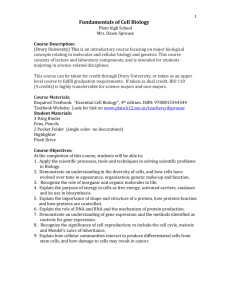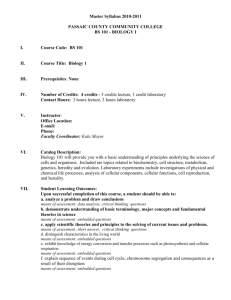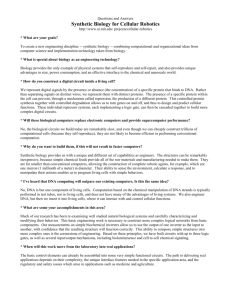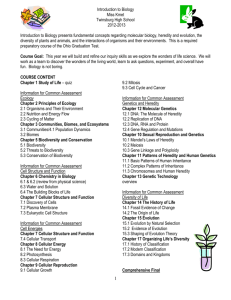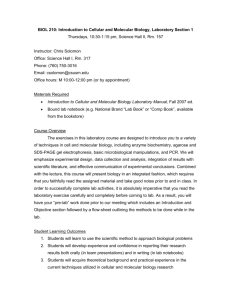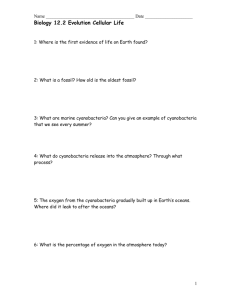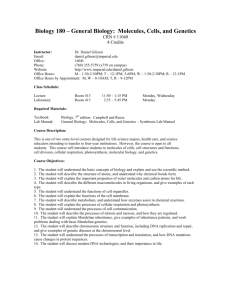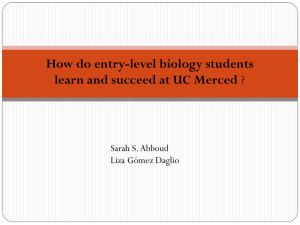Biology Course Syllabus - High School
advertisement
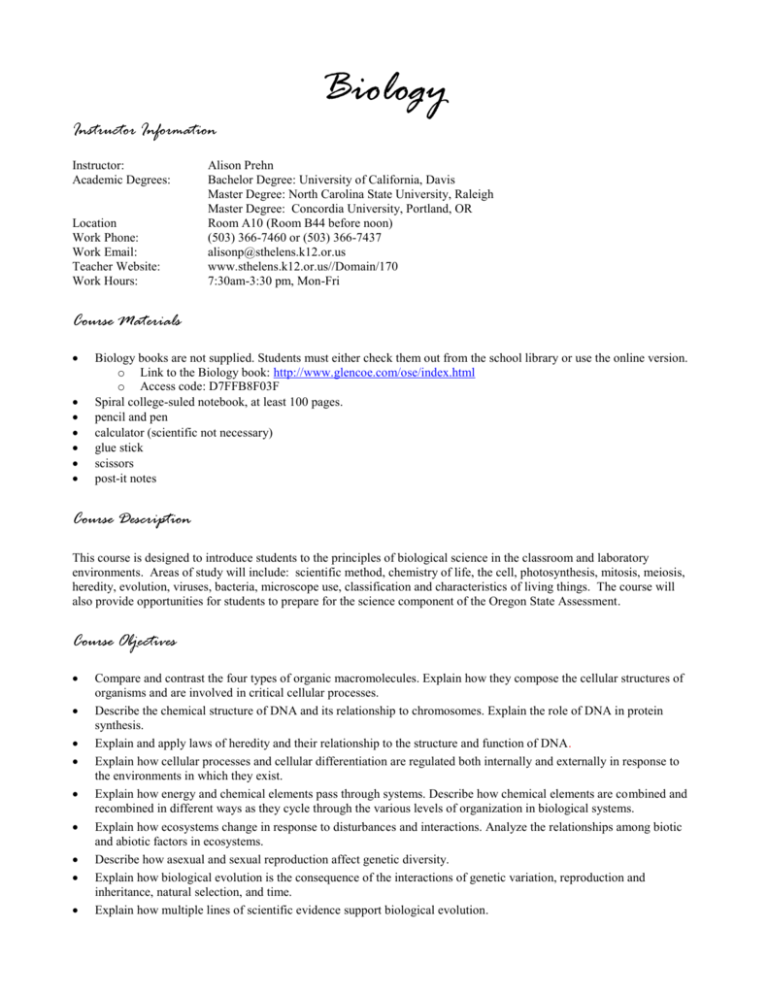
Biology Instructor Information Instructor: Academic Degrees: Location Work Phone: Work Email: Teacher Website: Work Hours: Alison Prehn Bachelor Degree: University of California, Davis Master Degree: North Carolina State University, Raleigh Master Degree: Concordia University, Portland, OR Room A10 (Room B44 before noon) (503) 366-7460 or (503) 366-7437 alisonp@sthelens.k12.or.us www.sthelens.k12.or.us//Domain/170 7:30am-3:30 pm, Mon-Fri Course Materials Biology books are not supplied. Students must either check them out from the school library or use the online version. o Link to the Biology book: http://www.glencoe.com/ose/index.html o Access code: D7FFB8F03F Spiral college-suled notebook, at least 100 pages. pencil and pen calculator (scientific not necessary) glue stick scissors post-it notes Course Description This course is designed to introduce students to the principles of biological science in the classroom and laboratory environments. Areas of study will include: scientific method, chemistry of life, the cell, photosynthesis, mitosis, meiosis, heredity, evolution, viruses, bacteria, microscope use, classification and characteristics of living things. The course will also provide opportunities for students to prepare for the science component of the Oregon State Assessment. Course Objectives Compare and contrast the four types of organic macromolecules. Explain how they compose the cellular structures of organisms and are involved in critical cellular processes. Describe the chemical structure of DNA and its relationship to chromosomes. Explain the role of DNA in protein synthesis. Explain and apply laws of heredity and their relationship to the structure and function of DNA. Explain how cellular processes and cellular differentiation are regulated both internally and externally in response to the environments in which they exist. Explain how energy and chemical elements pass through systems. Describe how chemical elements are combined and recombined in different ways as they cycle through the various levels of organization in biological systems. Explain how ecosystems change in response to disturbances and interactions. Analyze the relationships among biotic and abiotic factors in ecosystems. Describe how asexual and sexual reproduction affect genetic diversity. Explain how biological evolution is the consequence of the interactions of genetic variation, reproduction and inheritance, natural selection, and time. Explain how multiple lines of scientific evidence support biological evolution. Come up with a question that can be tested, design an experiment, conduct that experiment while making observations and collecting enough appropriate data to answer the question, analyze the data and figure out what you may still not know, come up with a conclusion and explain how it is supported by the evidence. Report your results. Course Outline Introduction Intro to Biology Scientific Method Beginnings of Life Cellular Processes Chemistry of Life Mitosis (project) Meiosis (project) Atoms, elements, bonds Macromolecules Enzymes and catalysts pH Respiration Photosynthesis DNA and RNA Structure and Function Replication Protein synthesis Cells Genetics Organelles (project) Diffusion and osmosis Cellular Diversity Passive and Active transport Mendel Punnett Squares Heredity Genetic Disorders (project) Evolution Darwin History of Life Natural Selection Diversity Ecology Biomes Nutrient Cycles Environmental Issues Populations Biodiversity Classification Levels of classification Kingdoms (project) Scientific inquiry will be incorporated throughout. Additional projects may be assigned at teacher’s discretion. Grading Policy Grading Scale: 90-100% = A, 80-89% = B, 70-79% = C, 60-69% = D, <60% = F Grade Breakdown: 60% unit exams and unit projects, 30% class work, homework, quizzes, 10% effort Unit exams and projects can be re-taken/redone as many times as students needs in order to get a passing grade. Exams may only be retaken on four dates during the semester, which will be announced at a later date (usually one Thursday after school in Oct, Nov, Dec, and Jan). Study sessions will be offered before each re-take. Absent and Late Work Policy Absences Students have as many days to make up work as he or she was absent (one day absent = work due one day after due date). Handouts can be found in the crate just inside the front door of the classroom, in the folder for the day it was handed out, and on my website. Students should always ask the teacher about what went on in class the day he or she was absent. This can only be done before or after school, and not during class time. A test or quiz must be made up within one week starting on the day the student returns from an absence. Any later and the test or quiz can be retaken for a maximum of only 75%. Late tests can only be taken before or after school, during pride period, or during lunch and only when pre-arranged with the teacher Late Work Late work is accepted for a maximum of 75% up until the point it is graded and returned to the class as a whole. Then it can no longer be submitted for credit. Strategies for Successful Students Successful students will… Come to class each day with their biology notebook and other required materials. Take notes when required and save those notes in their notebook for later studying. Take tests within a week of them being offered to ensure the information is most fresh in their minds, and retake it if needed after first re-studying the material. Use class time wisely and do work when assigned because even though it is accepted late, late work does little to further a students’ understanding if it is turned in after a major exam. Utilize academic pride periods by asking questions about things they do not understand. Study for all quizzes and exams by using their own learned techniques as well as those suggested by the teacher. Classroom Conduct and Expectations Students will treat others with respect. Students must show up on time, prepared, and be ready to go by the time the bell rings. Students will not leave class without the teacher’s permission. Packing up or standing up before being dismissed is not permitted. Bathroom use is limited. Cell phone use is not permitted. Music devices are not permitted except in testing situations. --------------------------------------------------------------------------------------------------------------------------------------------------------------------- DETACH, SIGN, AND RETURN TO MS. PREHN BY FRI, SEPT. 7. I have read and understand the policies of Biology. ____________________________________________________________________________________ Student signature Date ____________________________________________________________________________________ Parent signature Date Parent email address: ________________________________________________________________________
